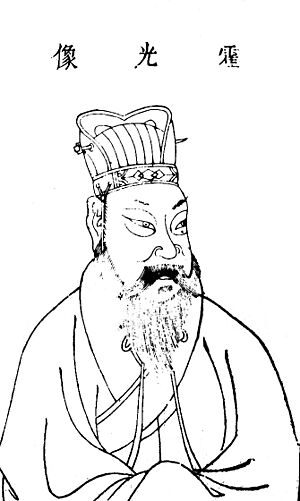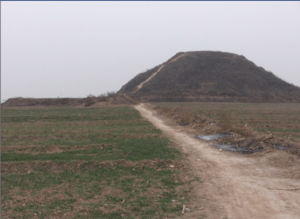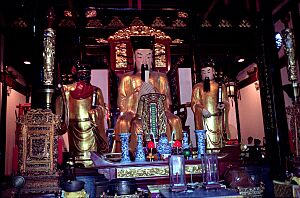Huo Guang facts for kids
Quick facts for kids Huo Guang |
|||||
|---|---|---|---|---|---|
| Marquess of Bolu 博陸侯 | |||||

Portrait of Huo Guang in Sancai Tuhui
|
|||||
| Marquess of Bolu | |||||
| Reign | 87–68 BC | ||||
| Successor | Huo Yu 霍禹 | ||||
| Born | Hedong, Pingyang County, Han | ||||
| Died | 68 BC | ||||
| Spouse | Lady Donglü Lady Xian |
||||
| Issue | Lady Huo Empress Huo Chengjun Huo Yu, Marquess of Bolu Lady Huo Lady Huo |
||||
|
|||||
| Father | Huo Zhongru 霍仲孺 | ||||
| Occupation | Military general, politician | ||||
Huo Guang (Chinese: 霍光; died 21 April 68 BC) was a very powerful general and politician in ancient China. He served the Western Han dynasty from 87 BC until his death in 68 BC. He was the younger half-brother of the famous general Huo Qubing. Huo Guang started as an aide to Emperor Wu. After the emperor died, Huo Guang became a main leader, helping to rule for the young Emperor Zhao.
Huo Guang became very influential. He put his family and loyal friends in important government jobs. When Emperor Zhao died, Huo Guang quickly chose a new emperor, Liu He, but then removed him after only 27 days! After that, Huo Guang helped Emperor Xuan become emperor. Huo Guang kept control of the Han government until he died.
Contents
Huo Guang's Early Career
Huo Guang was the son of Huo Zhongru. His half-brother, Huo Qubing, was a well-known general. Huo Guang's step-aunt was Empress Wei Zifu, who was the second empress of Emperor Wu of Han. We don't know much about Huo Guang's early jobs in the government. But by 88 BC, near the end of Emperor Wu's rule, he was already a high-ranking official.
When Emperor Wu was near the end of his life, he chose his youngest son, Liu Fuling (who became Emperor Zhao), to be the next emperor. Emperor Wu asked Huo Guang, along with two other officials, Jin Midi and Shangguan Jie, to be the young emperor's regents. A regent is someone who rules for a child king or queen. Huo Guang was put in charge of the government. When Emperor Wu died in 87 BC, Emperor Zhao was only eight years old. Huo Guang, Jin Midi, and Shangguan Jie were his main guardians.
Ruling with Emperor Zhao
Emperor Zhao was the youngest son of Emperor Wu. This caused problems with his older brothers. There were several plots against him during his rule. In 86 BC, a plot involving Liu Dan, the Prince of Yan, was found out. The prince was not punished, probably because Huo Guang decided not to. However, the other people involved were executed.
Huo Guang was the most powerful person among the regents and ministers of Emperor Zhao. He led all of them. For six years, from 87 BC to 81 BC, Huo Guang controlled the court. The country stayed peaceful during this time. Because he had so much power, he made the Shangguan family jealous.
In 85 BC, Huo Guang was given the title Marquess of Bolu. In the same year, Jin Midi, who helped keep peace among the regents, died. After Jin's death, Shangguan Jie became even more jealous of Huo Guang. This was even though they had been good friends. Huo Guang had even let his daughter marry Shangguan's son, Shangguan An. In 84 BC, Shangguan Jie tried to get more power. He arranged for his five-year-old granddaughter (who was also Huo Guang's granddaughter) to marry the emperor, who was 11. She became empress in 83 BC.
In 80 BC, the conflict between Huo Guang and Shangguan Jie became very serious. Shangguan formed a plot with Liu Dan, the Prince of Yan, and others. They tried to falsely accuse Huo Guang of treason. But Emperor Zhao trusted Huo Guang and did not believe the accusations. The plotters then planned a coup d'etat, which is a sudden takeover of the government. But their plan was discovered. Most of the plotters, including Shangguan, were executed. Liu Dan and the Princess Eyi were forced to take their own lives.
Even after Emperor Zhao grew up, Huo Guang still had a lot of influence over him and the court. He helped Emperor Zhao manage the empire. Many historians believe that Emperor Zhao never truly held real power himself. Huo Guang was the emperor's main advisor. He often convinced Emperor Zhao to:
- Forgive people for their crimes.
- Avoid expensive wars with other countries.
- Choose good officials for the government.
- Not punish people without a proper investigation.
- Support farming and save grain to prevent hunger.
Choosing a New Emperor
In June 74 BC, Emperor Zhao died when he was 21 years old. He did not have any children. Even though Emperor Zhao had older brothers, Huo Guang thought they were not good enough to be emperor. After looking into it, he decided to make Liu He, Emperor Zhao's nephew, the new emperor. Liu He was the Prince of Changyi.
However, once Liu He became emperor, he started spending money too much and acting badly. This happened during the time of mourning for Emperor Zhao. Because of this, Huo Guang decided to remove the new emperor. This was a very unusual action in Chinese history. With an order from Empress Dowager Shangguan (Huo Guang's granddaughter), Prince He was removed after only 28 days as emperor. He was sent back to his old home, but without his princely title.
Huo Guang then needed to find another emperor. He wanted someone who was hardworking and skilled. Another official, Bing Ji, suggested Liu Bingyi. Liu Bingyi was a great-grandson of Emperor Wu. He later became Emperor Xuan. Liu Bingyi's grandfather, Liu Ju, had been Emperor Wu's crown prince but was later killed. His family had been removed from the royal household.
Working with Emperor Xuan
In 73 BC, Huo Guang offered to give all his power back to Emperor Xuan. But the emperor refused. He said that all important matters should still go to Huo Guang first, before Huo Guang presented them to the emperor. The emperor also gave important jobs to Huo Guang's son, Huo Yu, and his grandnephews, Huo Yun and Huo Shan. Huo Guang's sons-in-law were also made high military commanders. For the next few years, Huo Guang and the emperor shared power.
In 71 BC, Huo Guang's wife, Lady Xian, wanted her daughter, Huo Chengjun, to become empress. So, she poisoned Emperor Xuan's wife, Xu Pingjun, by bribing her doctor. In April 70 BC, Huo Chengjun became empress.
Even though Emperor Xuan showed respect to Huo Guang, it was said that he feared Huo Guang. He felt like Huo Guang was "a thorn in his back." This, along with Huo Guang's family acting too proudly, would cause big problems for the Huo family later.
Huo Guang's Death and Family's Downfall

In April 68 BC, Huo Guang became sick and died. Emperor Xuan and Empress Dowager Shangguan did something very rare: they personally went to Huo Guang's funeral. They also built a very impressive tomb for him. After Huo Guang's death, his sons, sons-in-law, and grandnephews kept their important jobs and were given noble titles. The Huo family lived very luxurious lives, similar to the royal family.
Emperor Xuan was not happy about the Huo family's pride. He slowly started to take away their real power, while letting them keep their titles. In May 67 BC, Emperor Xuan made his son, Liu Shi (who later became Emperor Yuan), the crown prince. Liu Shi was the son of the deceased Empress Xu. This made Lady Xian very angry. She told her daughter, Empress Huo, to try and kill the crown prince. Empress Huo reportedly tried many times but failed. Around this time, the emperor also heard rumors that the Huo family had murdered Empress Xu. This made him take away even more of the Huo family's power.
In 66 BC, Lady Xian told her son and grandnephews that she had indeed murdered Empress Xu. Fearing what the emperor might do if he found out for sure, Lady Xian and her family members planned to remove the emperor. But their plot was discovered. Emperor Xuan had the entire Huo family executed. Empress Huo was removed from her position. Twelve years later, she was sent away from the capital and took her own life.
Even after the destruction of the Huo family, Emperor Xuan continued to honor Huo Guang. In 51 BC, he had portraits of 11 great leaders painted in his palace. Huo Guang was the only one of the 11 who was called only by his title and family name. This was considered an even greater honor than what the others received.
Huo Guang's Legacy
People in later times had mixed feelings about Huo Guang. On one hand, he was greatly admired for his skill in running the empire. He was also praised for being selfless when he bravely removed an unfit emperor. On the other hand, he was criticized for ruling like a dictator. He was also criticized for favoring his family and not controlling their bad behavior. Some historians say these traits led to his family's downfall after his death.
Many people in Chinese history who later tried to take power often claimed they were acting for the good of the empire, just like Huo Guang. But few actually did. Also, when emperors wanted to accuse officials of treason, they would sometimes say they "wanted to act like Huo Guang." Huo Guang set a high standard for being decisive and strong. This strength was rarely matched, and even more rarely used for the good of the country.
 | Claudette Colvin |
 | Myrlie Evers-Williams |
 | Alberta Odell Jones |


